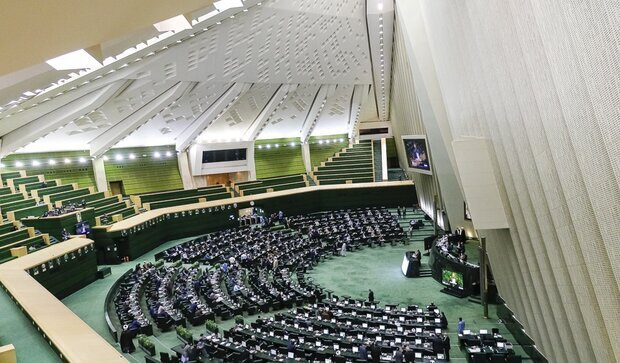Iranian Parliament passes generalities of anti-sanction plan

According to Mehr, 251 lawmakers voted in favor of the generalities of the double-urgency plan, which is dubbed “Strategic Action to Lift Sanctions”.
The bill, put forward by the lawmakers in early November, is part of a broader strategy that aims to lift the United States sanctions on Iran. It aims to force the United States into lifting sanctions on Iran by doubling down on nuclear activities.
After the vote, the MPs shouted “Down with America” and “Down with Israel”.
The development came four days after Iran’s top nuclear scientist, Mohsen Fakhrizadeh, was assassinated near Tehran, in what appeared to be a plot by the U.S. and Israeli regimes.
Speaking after the passing of the plan, Parliament Speaker Mohammad Bagher Ghalibaf said the move’s message to the enemies was that the “one-sided game is over.”
The bill requires the government to raise uranium enrichment levels to 20% and install advanced centrifuges.
According to the 9-article bill, the Atomic Energy Organization of Iran (AEOI) will be required to produce and store at least 120 kilograms of enriched uranium with 20 percent purity at the Fordow nuclear facility every year, and to fulfil the country’s peaceful industrial demands with uranium enriched above 20%.
Once the bill becomes a law, it will oblige the AEOI to increase the monthly output of enriched uranium for various peaceful purposes with different purity levels by at least 500 kg.
The bill entails uranium enrichment activities with at least 1,000 IR-2M centrifuge machines at Natanz within three months after the ratification of the law, and compels the AEOI to launch uranium enrichment as well as research and development activities with at least 164 IR-6 centrifuges and increase the number of centrifuge machines to 1,000 within a year after the ratification of the bill.
The new bill also necessitates the inauguration of a metallic uranium factory in Isfahan within 5 months and restoration of a 40-Megawatts heavy water reactor in Arak, which was supposed to be re-designed and optimized under the 2015 Iran nuclear deal. The bill requires the government to prevent any foreign access and monitoring beyond the Additional Protocol.
The bill also requires the government to suspend the voluntary implementation of the Additional Protocol to the nuclear Non-Proliferation Treaty (NPT) three months after the ratification of it if the parties to the nuclear deal between Iran and world powers, officially known as the Joint Comprehensive Plan of Action (JCPOA), failed to uphold their obligations under the JCPOA.
According to the double-urgency bill, the president and related officials in executive bodies are responsible to implement the law.
During the session, MPs spoke in favor of and against the plan.
Abolfazl Amouei, the spokesman of the Parliament’s National Security and Foreign Policy, said the Parliament is tasked with continuing the path of the martyrs in order to revive the country’s nuclear program.
One of the goals of the strategic action is to counter the sanctions that were imposed by Western countries, Amouei said.
He also said, “We must proceed in such a way that destroying people’s security and assassinating our country’s scientists and imposing cruel sanctions against our country would not be cost-free for the enemies.”
MP Rajab Rahmani, speaking in favor of the move, said Iran showed its goodwill but the U.S. and the other five signatories of the 2015 nuclear agreement did not fulfil their commitments.
Rahmani said the U.S. withdrew from the nuclear deal, and the other countries only paid lip service instead of meeting their obligations.
“This plan is for protecting national interests, lifting sanctions and solving the people’s livelihood problems,” he added.
Speaking against the strategic action, Ebrahim Azizi praised the plan but added that some of its items need to be reviewed.
“We gave the enemy a chance for seven years, during which we witnessed the intensification of sanctions and increased economic pressures,” Azizi remarked. “Therefore, we should not give the enemies even one more day.”
MP Ali Mousavi said he supported the plan but it needs to be referred to the national security committee so that further items be added to it to make it more decisive.
“We must deliver a hard slap on the enemy’s face but this plan is not capable of this matter and it must become stronger,” he added.
The Nov. 27 assassination of Fakhrizadeh has made the MPs more determined to accelerate Iran’s nuclear activities slowed under the JCPOA.
MP Nasrollah Pezhmanfar has said the Parliament seeks to mandate the government to end the inspections of Iranian nuclear and military installations by the International Atomic Energy Agency (IAEA).
Writing on his Twitter account on Saturday, Pezhmanfar said the government will be tasked “to retaliate quickly against U.S. and Israeli terrorist leaders and to reduce the level of the Agency’s inspections of nuclear and military facilities to zero.”
Source: Tehran Times

